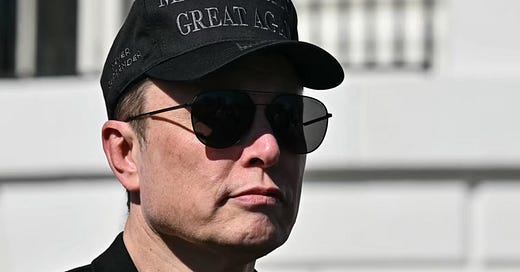S1.C68. TELL ME WHY - Tesla
BY PHUONG ANH - Tesla faces a leadership and brand crisis, with Elon Musk disengaged as sales slump, investor confidence drops, and the company struggles to manage mounting public backlash.
Tesla, once the epitome of innovation and environmental progress, is now grappling with a severe brand and operational crisis. Despite holding its position as America’s leading electric vehicle manufacturer, the company’s future appears increasingly uncertain due to falling global sales, brand identity erosion, management absenteeism, and growing investor unrest. At the center of this crisis is Tesla CEO Elon Musk—widely acknowledged as the driving force behind the company’s meteoric rise, but now conspicuously absent when his leadership is needed most.
In the first half of 2025, Tesla has emerged as one of the worst-performing stocks in the S&P 500. Sales are declining globally, the resale market in the U.S. is collapsing, and quality control issues like the recent Cybertruck recall for faulty exterior panels are raising concerns. In a symbolic blow, Tesla was recently removed from the Vancouver International Auto Show over safety concerns. Moreover, a Financial Times analysis has highlighted a mysterious $1.4 billion gap in the company’s balance sheet, further unsettling investors.
Tesla’s brand, once embraced by progressive and eco-conscious consumers, is now associated with a more polarizing identity. Musk’s increasingly erratic public behavior and controversial political leanings have alienated a significant portion of the company’s original customer base. Analysts like Dan Ives from Wedbush Securities, a long-time Tesla bull, have publicly declared the company in crisis, urging Musk to re-engage with leadership. “Tesla is Musk, and Musk is Tesla,” Ives writes, underscoring the irreplaceable connection between the CEO and the company’s brand equity.
Despite escalating investor anxiety, Musk has not been visibly engaged in addressing the turmoil. Instead, he has diverted his attention to social media antics and cryptocurrency projects, particularly Dogecoin. Investor Ross Gerber has even suggested the need for Tesla to consider appointing a new CEO. On the rare occasions Musk does address Tesla matters—such as during a recent all-hands meeting—his reassurances about achieving full vehicle autonomy have failed to inspire confidence.
Wall Street’s tolerance for Musk’s unorthodox behavior has historically been high due to Tesla’s industry dominance and innovation. Investors were willing to overlook his inflammatory tweets, pandemic misinformation, and public outbursts because he delivered results. However, this patience appears to be wearing thin. Unlike in 2018, when Musk famously camped out on Tesla’s factory floor to fix Model 3 production issues, he now seems distant from the company’s day-to-day struggles.
Tesla’s market share is being eroded not just by internal missteps, but by growing competition in the EV sector and stagnation in product innovation. The lack of meaningful updates or new compelling models has allowed rivals to catch up. Additionally, Tesla’s stock has lost half its value since December, reflecting broader concerns about governance, strategic direction, and financial management.
Public support for Tesla has also waned. Attempts by high-profile figures like Commerce Secretary Howard Lutnick and President Donald Trump to promote the brand have offered only fleeting stock boosts. These short-lived rallies highlight a deeper truth: investor confidence and public goodwill cannot be sustained without visible leadership and coherent strategy.
Ultimately, Tesla’s current predicament reflects a brand in decline and a company in need of strong, focused leadership. Whether Musk can—or will—return to steer the ship remains the central question. Without his direct involvement and renewed commitment to Tesla’s core mission, the road ahead looks increasingly uncertain.
Here are 3 questions for you :
1. How aligned is the CEO’s public behavior with the brand identity and customer base Tesla built its success on?
Tesla's early customer base leaned progressive and sustainability-focused. Elon Musk’s recent polarizing political and social stances may have alienated this segment. This divergence between brand promise and leadership persona is eroding trust.
2. What proactive governance mechanisms should the board implement to ensure CEO accountability during periods of reputational or performance decline?
The board appears passive despite warning signs — falling sales, brand damage, and investor unrest. A more engaged board could have imposed checks or even appointed an operational co-leader during Musk’s distraction with other ventures.
3. Is Tesla's innovation pipeline and go-to-market strategy still competitive in a rapidly maturing EV market?
Tesla's stagnation in product refreshes and customer experience innovation has allowed rivals to catch up. Strategic focus on expanding the Cybertruck instead of enhancing core models or affordability may reflect flawed market prioritization.
Provide the question# on your comment when you answer.
READ MORE SCORE MORE
PREVIOUS
S1.C67. TELL ME WHY - Landa Digital Printing
·Landa Digital Printing, once heralded as the future of commercial printing, is now facing a cashflow crisis so severe that it has turned to the courts for protection. After more than a decade of ambitious innovation and over US$1.3 billion in investor funding, the Israeli-based company finds itself in financial distress, having laid off hundreds of empl…
NEXT
if you have difficulties accessing any of these documents to read, please feel free to revert to us
Here is a quick guide if you want to change the article into languages of your choice…. but you already know this







Why is it risky for a company to tie its entire brand identity too closely to one individual, no matter how visionary they are?
#"What is Tesla doing today that will keep it relevant and leading five years from now?"